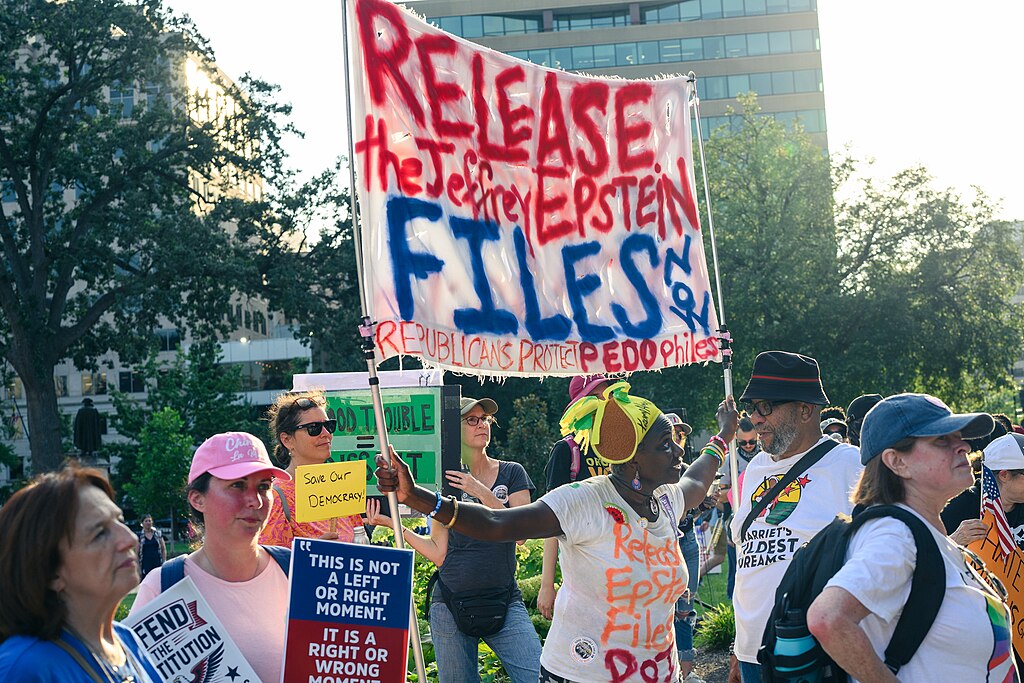Survivors of Jeffrey Epstein’s trafficking network stood outside Capitol Hill this week with an ultimatum. If Congress won’t release all the files, they’ll compile and release their own list of alleged participants.
Marina Lacerda was speaking publicly for the first time. She directly challenged Trump’s dismissal of their efforts as a Democratic hoax. But she has particular credibility here. She was the key witness who helped federal prosecutors charge Epstein in 2019.
Epstein died by suicide before trial, leaving survivors without full justice. Then, Trump promised during his campaign to release all Epstein files, but backtracked after taking office. After years of broken promises, survivors are taking matters into their own hands. They want transparency, and they’ll get it one way or another.
The Girl Who Saw Everything
Lacerda wasn’t just another survivor, she was “Minor-Victim 1” in Epstein’s 2019 federal indictment. After immigrating from Brazil with her family, she lived in Queens, sharing a single bedroom with her mother and sister, when a friend introduced her to Epstein as a way to make money at age 14.
For the next three years, she was inside his operation. In an interview with ABC News, she describes his New York mansion as a “revolving door” where Epstein saw five to ten women daily. Photos of celebrities and politicians hung throughout his home. She heard his phone calls with high-profile people. Epstein eventually paid her thousands of dollars, and she believed being associated with him would open doors as an immigrant.
When she turned 17, Epstein told her, “you’re too old,” and she began recruiting younger girls for him. This wasn’t someone watching from outside. She witnessed how the network operated day by day, giving federal prosecutors the foundation they needed to build their case against Epstein.
A Pattern of Broken Promises
The FBI first contacted Lacerda in 2008. When agents arrived at her door, she immediately called Epstein, who provided her with a lawyer. But something had shifted for her after years of abuse and recruiting other girls. She was ready to tell her story.
Lacerda was prepared to testify before a grand jury about her childhood sexual abuse. She was finally going to speak about what happened in that revolving door mansion, about the photos on the walls, about the network she had witnessed from the inside. But Epstein secured his controversial plea deal before she could take the stand.
“I would have felt much better today speaking if I was able to speak in 2008,” she says now. “If they gave me the chance to speak, these women would not be through this.”
11 years passed before investigators returned. This time, they used her evidence to charge Epstein in 2019, but he died by suicide before trial. Then, during Trump’s 2024 campaign, he promised to release all Epstein files. But after taking office in January, his administration backtracked. No additional files would be released.
The decision sparked backlash from his own MAGA supporters who had expected transparency. In July, the Justice Department announced they found no evidence that Epstein kept a “client list.” But the victims who lived inside the network know better. They saw the photos and they heard the phone calls. They know who was there.
They’re Done Asking Permission
On September 3, Marina Lacerda stood with seven other survivors before lawmakers at the Capitol. Her voice carried decades of frustration. “We are here. We want this bill to pass. It is very important, OK? And we need transparency. We are tired of looking at the news and seeing Jeffrey Epstein’s name and saying that this is a hoax. We are tired of it.”
They are there to fight for the Epstein Files Transparency Act, which would force the Justice Department to release all government records related to the case. Representatives Thomas Massie and Ro Khanna are collecting signatures for a discharge petition to force a House vote. But the survivors hold names, faces, and stories that powerful people hoped would never see daylight. If Congress won’t force the government to act, they say they will compile and release their own list of participants in Epstein’s network.
Anouska De Georgiou, who testified about her abuse as a teenager, challenged lawmakers directly. “To be clear, the only motive for opposing this bill would be to conceal wrongdoing. You have a choice. Stand with the truth or with the lies that have protected predators for decades.”
Sky Roberts brought a different weight to his words. His sister Virginia Roberts Giuffre had fought for over a decade as one of Epstein’s most prominent accusers before taking her own life earlier this year. Roberts spoke for survivors who could no longer speak for themselves. “The survivors of this horrific abuse are watching. The American people are watching, and history is watching. Which side will you be on?”
The question cuts to the heart of the political battle now unfolding. Politicians must choose between transparency and protecting powerful people who might face prosecution if those files become public.
The Truth Will Come Out
The Epstein survivors who gathered at the Capitol represent something new. They’re no longer asking permission or waiting for officials to act. Lacerda and the others have moved past hoping the system will work for them.

Their message to Congress is simple. Pass the transparency bill or watch them do the work themselves. They know who was involved because they lived through it. The choice now belongs to lawmakers who must decide whether to stand with survivors or continue protecting those who enabled decades of abuse.
Read More: Speaker Mike Johnson Retracts Claim That Trump Acted as FBI Informant Against Epstein

